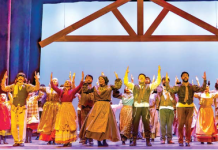
By Elizabeth Wulfhorst | ewulfhorst@tworivertimes.com
Dancing past midnight, group photos, open bars, hundreds of guests: These are just some of the usual images of pre-pandemic weddings. But since March 2020, many “normal” parts of weddings have changed because of COVID-19. While sporadic lockdowns continue and restrictions wax and wane, couples wanting to get married can still celebrate their union in a way that honors the traditions without putting family and friends at undue risk.
Just a few trends that brides and grooms are embracing include tents, micro weddings, livestreaming and sanitation stations.
Kathleen Deo, a wedding consultant based in Shrewsbury, said her last pre-COVID wedding was Feb. 15, 2020, at Navesink Country Club. “It was gorgeous and winter and just such a beautiful weekend and then, you know, a few weeks after that things star ted changing completely,” she said.
Deo was lucky enough not to have any more bookings scheduled until May – she considers May through October her “high season” when she has the bulk of her weddings – so initially thought she wouldn’t have to alter plans. She said the “whole industry” was convinced they would be “fine” by the time scheduled late spring and summer wedding dates came around. But that wasn’t the case.
“Eighty percent of my weddings that were scheduled for 2020 postponed to 2021,” Deo said. She also had a couple of outright cancelations.
Deo, a graduate of Red Bank Catholic, has a degree in psychology – her “secret weapon” – which she said has helped her as a wedding planner and came in especially handy in 2020.
She offers standard and fully customizable “day-of coordination,” which can start anywhere from two to eight weeks out from the wedding date, and other planning and add-on services that can help make a couple’s wedding day stress-free. Because of the postponements and previously scheduled weddings, Deo is completely booked for 2021 and is already scheduling 2022 dates.
“A lot of my brides are just ‘day of’ where I’m not actually planning their wedding but I’m helping them the month of (the wedding) and actually doing logistics and all that kind of stuff so they were actually the ones doing the planning,” she said. “But they were relying on me for advice and suggestions and direction and no one knew what to do” in the first few months of the pandemic because rules and restrictions on gatherings were changing all the time, Deo said.
THE TENTS GO UP
Tent weddings have become especially popular during the pandemic because there were always fewer restrictions on outdoor gatherings than inside buildings. From early on, the CDC stressed the dangers of indoor gatherings and encouraged outside, socially distanced events.

Kristen Malloy from Highlands completed an accelerated nursing program in December 2019 and was scheduled to begin working at Monmouth Medical Center in March 2020. She was also scheduled to get married in June at Spring Lake Bath & Tennis Club. Because of the pandemic, she didn’t begin working until May and increasingly felt the stress of her new job combined with an impending wedding date in flux. The manager at the venue kept them apprised of the changing restrictions and gave them the options of choosing a new date or canceling outright.
Malloy and her then-fiancé Matt had sent out about 220 save-the-date cards, but as pandemic restrictions grew and lingered, first her bridal shower was canceled and then they made the difficult decision to postpone the wedding. While they had yet to pick a new wedding date, Malloy said, “We weren’t going move it to 2021, no matter what, because we knew we want to start a family right away.”
In August, Malloy’s sister, who lives in Middletown, saw Malloy’s increasing frustration and offered her backyard as a wedding venue. “Summer was almost over and it seemed like things were kind of getting back to normal and more things were opening up, so we were like, You know what? Let’s just plan it and whatever happens happens and whoever’s comfortable coming can come,” Malloy said.
A good friend and also wedding photographer suggested Malloy call Deo since they were going from an all-inclusive event at a venue to a backyard wedding needing separate vendors for every element. “I was like, we have two months to throw this whole thing together. There’s no way I can do it by myself,” Malloy said, noting that both her job and her husband’s job are stressful. Matt is a tugboat captain who was then working three weeks on, three weeks off in Texas.
The Malloys were able to use their original photographer, DJ and florist, but Deo had to procure a tent, caterer, tables, seating and more. They used Brennan’s Delicatessen in Rumson for the food and Bay Ave. Bakery in Highlands for the cake. In the end they spent more than their original budget for the wedding which Deo said is not unusual for a tent wedding.
“Don’t be surprised if your budget is going to be a little bit more, or equal to where you were with your venue,” she said, which always catches people off-guard. “You are no longer in a venue with a roof over your head, with air conditioning and heat and tables and chairs and staff and everything else. You are now in the middle of a backyard or farm… and we’re bringing in every single fork, every chair, every plate, every light, every everything, and you’re building this atmosphere or this vibe out of nothing.”
“To create that wedding atmosphere and everything that goes into it is a lot of money,” Deo said.
The Malloys invited about 185 guests to the October wedding and ended up with about 120, a hundred fewer than their original list. The weather was perfect, Kristen said, and “now that I look back on it and I see everything and looking at the pictures, I’m so happy that we ended up doing it there rather than inside a banquet hall,” Malloy said. “I’m just so glad we didn’t wait until 2021.”
SMALLER IS BETTER DURING A PANDEMIC
Deo said another new trend in the industry is the “micro wedding.” It was a term heard often in 2020 and she sees the trend continuing in 2021. Instead of 200 people or more at a wedding, couples are “really tailoring things down,” she said. “One of my micro wedding brides is literally having 25 people, and she is doing a Zoom for her guests and her family members that are not going to be in attendance.”
Jay Cook and Rebecca Sutch of Middletown managed to keep their scheduled wed- ding date and venue by quickly adjusting to changing COVID-19 restrictions, and one way was by drastically reducing the number of guests. Their original guest list topped 175, Cook said, but even though restrictions eased somewhat in the run-up to their June 27 date, that list was whittled down to close family and people in the bridal party. They were able to have the ceremony and celebration with fewer than 50 people outside on the back deck at Buttonwood Manor in Matawan, with Lake Lefferts as a backdrop.
“It went from being, you know, a big wedding with all the bells and whistles to a super-tight, close-knit ceremony,” Cook said, “but it worked.”
Sutch said they spent about three hours at the venue and then went to her parents’ house to continue the outdoor celebration. She noted that it was important to them to get married in 2020 because they “had a lot of older relatives and a couple people who had some scary health turns last year.” As it turns out, Sutch is very glad they didn’t wait; her grandfather died in August.
And even with a small, outdoor wedding, COVID precautions are necessary. “Everyone wore masks besides when they were eating,” Sutch said. “And everyone said they had fun,” she added with a laugh.
The couple is planning a reception “maybe this year, maybe next year, maybe whenever COVID allows the world to be normal again,” she said. “But at least we had our immediate family and all of our grandparents got to see us which was, you know, really important for us.”
Sutch and Cook said they were lucky because all of their vendors worked with them to adapt to the changing demands. With a small wedding, the little details can become especially important. Their florist, Craig Kiely of Craig Kiely Designs in Red Bank, is also their neighbor. After getting the final go-ahead from the venue Tuesday, Sutch said by Saturday he made the place look like “you would have no idea it was in the middle of COVID.”
“He came in and really made it what it was,” she said.
Sutch also got lucky with the timing for her dress fitting. She picked up the gown in February, two weeks before everything shut down, but it still needed alterations to fit properly – a problem with nonessential shops closed. But a week and a half before the wedding the tailor was allowed to open, with one person in the shop at a time. “I liter- ally got one and a half fittings and then that was it,” Sutch said. “I picked my dress up and it fit and I was like, ‘I love you!’ ” she said about the tailor.
WHEN WILL THE WEDDING INDUSTRY BOUNCE BACK?
Deo continues to book new weddings which helps keep her business afloat. “It’s an interesting business where you are making money – and this goes for planners, florists, photographers – anybody in the wedding industry is making their money not only from their initial deposits, but then the final deposits which are paid the week of the wedding,” Deo explained. But with many weddings pushed to 2021, those second payments never came in, creating a “big lull” in revenue for wedding vendors. Deo said she has not come across many vendors that have “closed their doors or called it quits” because of the pandemic. “They have, thank goodness, been able to hang on throughout 2020 based on those deposits that they had already received,” she said.
“The light at the end of the tunnel has been the reschedules into 2021 and then the herd of new 2021 brides coming,” Deo said. “It’s going to be a big year because all of the money that we should have gotten in 2020 is now getting piled onto 2021.”
“It’s been tough,” she said, “but I think people have really been hanging on and they have their hopes set on 2021-2022 to come back, financially, from where we were.”
For Deo, the bright spots of an otherwise dark year for everyone, were the weddings that took place, even in modified form.
“Even though we were in the middle of a pandemic, we were still able to put on incredible celebrations for these brides and grooms and that might give hope, you know, to the 2021 brides and people moving forward, that anything is possible.”
This article originally appeared in the Feb. 11 – Feb. 17, 2021, print edition of The Two River Times.














